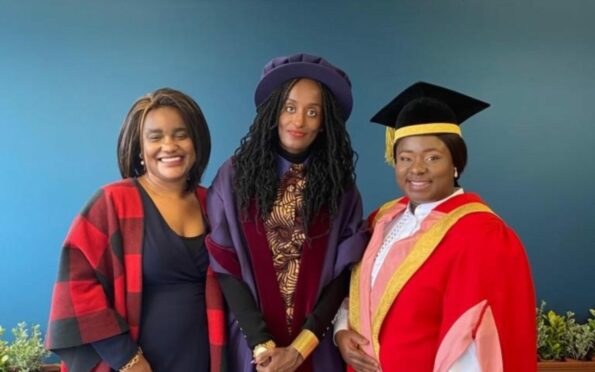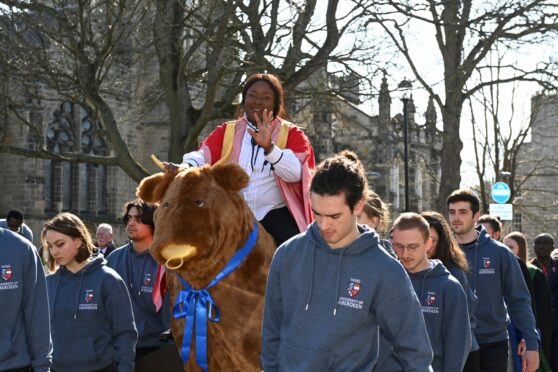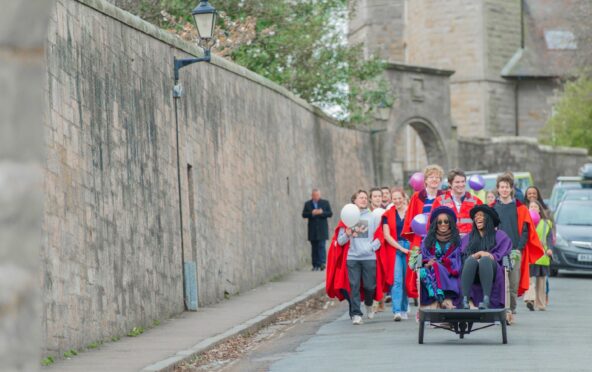After Martina Chukwuma-Ezike was announced as the new rector of Aberdeen University, her husband leaned over to whisper in her ear.
“Did you hear her?” Uchenna asked.
“She said you were the first black person for a university that is 525 years old. Can you imagine that?”
The Nigerian asthma charity boss was following in the distinguished footsteps of figures including Winston Churchill and philanthropist Andrew Carnegie by taking on the centuries-old role last year.
But as the first person of African descent and only the third woman in the position, she would be broadening that path in a way none of her predecessors had.
Martina looked back at her husband and said: “Well, no pressure. I guess I will do my best.”
But her achievement was even more significant than it first appeared.
She was among three black women who have been elected rector of one of Scotland’s ancient universities within 13 months, following Dr Leyla Hussein of St Andrews and Debora Kayembe of Edinburgh.
All three were making history as the first women from Africa to serve that role.
The trio of black women rectors up for the first time at Dr Hussein’s installation on April 15 – despite being the first of the three to be elected, in October 2020, she was the last to go through the formal investiture ceremony after it was repeatedly delayed by the pandemic.
She had insisted Mrs Chukwuma-Ezike and Ms Kayembe were invited.
Dr Hussein said: “It was a very special moment, the three of us interacting and reflecting on what it feels like to be in that position.
“Obviously, it’s a very privileged position to be in, but we also know the impact it comes with.
“So it was nice to be able to share that experience with other people who look like you.”
Life of moving and campaigning
The Fife university’s new rector describes herself as a campaigner, psychotherapist, clinician and activist.
Her “privileged” Somali family lost everything in the country’s civil war when she was 10, and two years later they moved into a council flat in East London.
Less than a decade later, she started getting involved in campaigns around female genital mutilation – something she experienced herself.
Her work in the area has led to her being Bafta-nominated for a 2014 Channel 4 documentary she presented, as well as being awarded an OBE.
When she was first approached about running for rector, she was reluctant, knowing she would soon be moving to Kenya for work. But the students’ passion won her over.
Among her predecessors in the role is Jan Christian Smuts, who led the segregated Union of South Africa for 14 years in the first half of the 21st Century.
Dr Hussein said: “That’s the history that St Andrews carries, so we can’t forget that. That history is there.
“Now that you’ve elected a black woman, great, you’re trying to break that – but then what happens after?”
She said she is determined not to simply serve as a ticking box, or “a black person who sits there and doesn’t say a word”.
Similarly, Mrs Chukwuma-Ezike said she has a firm list of priorities to tackle during her time as rector – student mental health, climate change and employability – and hopes her story can be inspirational to everyone at the university.
Black women rectors as a ‘symbol’
She said: “I think, in many ways, for young students irrespective of their backgrounds, black or white, they all saw me as a symbol that means they too can achieve anything once they’ve put their mind to it.
“That’s what I was re-emphasising in my [installation] speech: you can achieve whatever you set your mind to, all you have to do is put in a little hard work that is deserving of any opportunity and be the best you can be.”
Edinburgh University rector Deborah Kayembe said all three of the women would agree that they cannot deny the existence of racism, adding: “institutional racism is still very much present.”
She said: “What it has to say about Scotland that three women of African descent are rectors of ancient universities, that Scotland shows to the rest of the world that they can make a change when it is necessary for the good of Scotland.”
Ms Kayembe has since been embroiled in controversy relating to a tweet in which she accused the Rwandan president of orchestrating the 1994 genocide in the country.
Amid calls to resign her role at Edinburgh, she has now locked her Twitter account, while the university has distanced itself from the remark.
‘Something to celebrate’
All three black women rectors said their election signified something important for Scotland, a country where the first women of colour MSPs were only voted in last year.
An embracing of new stories and change, alongside an acknowledgement that there are challenges still to come.
Dr Hussein said: “Scotland’s always been ahead, in comparison to the rest of the United Kingdom – we kind of know that! But this has just been proven.
“I guess the next step for Scotland is, you don’t just want to have these women as just pictures you put around university.
“There has to be actions followed up.”
Mrs Chukwuma-Ezike added: “What a tremendous achievement.
“Three women – that’s equality in the highest regard. Occupying these significant positions, and again all minorities.
“I think that is something to celebrate, and everybody is echoing the same sentiment.”


